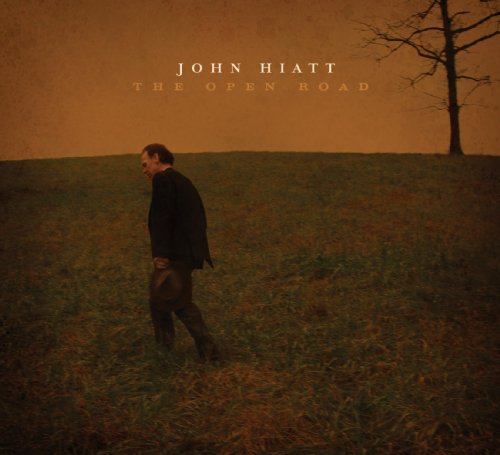Videos by American Songwriter
JOHN HIATT
The Open Road
(NEW WEST)
[Rating: 4 stars]
[wpaudio url=”https://savageventures-develop.go-vip.net/wp-content/uploads/2010/03/The-Open-Road.mp3″ text=”John Hiatt – The Open Road”]
John Hiatt immediately sets ablaze asphalt underfoot.
“Shrunken head and Mardi Gras beads,” the celebrated songwriter sings as howling, hooky guitars unhinge The Open Road’s title track, “hanging on the rearview mirror that bleeds/Keeping her eyes on the open road/No telling where that son-a-bitch goes.” Either way, journey outweighs destination. “Got her doors locked, doin’ 75,” he continues. “Don’t care if they’re caught now, dead or alive.” At 57, Hiatt’s highways clearly aren’t lost. His truths shake free as the speedometer quivers and quakes.
Velocity rarely wavers. Hiatt’s earthy protagonists at once weave wistful dreams (“Haulin’”) and lively pastiches (“My Baby”). They blindly chase hearts (“Wonder of Love”), but willfully repent (“What Kind of Man”). At crests, Hiatt’s own wisdom gained (“Movin’ On”) tempers youthful bravado lost (“Like a Freight Train”). Ultimately, this road’s righteous ribbon uncurls unto its sweetest reward (“Carry You Back Home”). All stars align.
Its platinum key: Spilling four-color detail across already vibrant landscapes. Hiatt unfastens sunsets like complex, Faulknerian shadows. “My baby puts her hairspray on/With a lit cigarette in her mouth,” he declares on the circular blues “My Baby.” “Takes her fingernail polish off/Speedin’ down some rural route.” Boy, imagine this lusty beauty matching wits with Guy Clark’s Arizona Star. “She once trained a horse to do cartwheels/Put a coyote in a sleeper hold,” the story allows,“her heart’s been pierced by love repeatedly/But her mind is magnetic and bold.”
The Indiana native ceaselessly extracts extraordinary snapshots from ordinary lives. His wayward workaday angels live and love and lose with welterweight fury. They love again. Regrets are many, but hopes are more. Tenacity fortifies desire. Hiatt’s foggy vocals, always (for good and ill) lending Kristofferson-like authenticity, double down on reach and redemption. Swagger thinly veils vulnerability. In turn, listeners mightily stab fists skyward as the obstinate songwriter drives on.
Occasionally, he cracks knuckles. “Kickin’ and a-screamin’/Only way I learn/I’m afraid of my own shadow/Not the bridge around the turn,” Hiatt howls on “Go Down Swingin’,” the album’s most dogged declaration. “Well, I lost myself and found myself/While you were kissing ass/And I know it’s not your nature/Just to let me pass/I’m gonna go down swingin’/Singin’ until the end.” Believe it.
For Hiatt never minces words—he shoots straight lines and minds no boundary, effectively restoring nobility to the criminally overused brand “songwriter’s songwriter.” Trace a brief history. Hiatt’s sinewy surrealism (his 1974 debut Hangin’ Around the Observatory) guilelessly morphed into brawny blues (1983’s Riding with the King), swampy groove (1988’s Slow Turning), explosive rock (1993’s Perfectly Good Guitar) and muscular folk (2008’s Same Old Man). Along the way, he crafted a roadhouse masterwork (1987’s Bring the Family) and arguably an era’s finest acoustic collection (2000’s Crossing Muddy Waters).
The Open Road triangulates that scrum at top. Hiatt’s irresistible here, shape-shifting between genres and gesticulating himself silly (“Fireball Roberts”). He bemoans ungraceful aging—“Was top dead center, baby,” “Like a Freight Train” goes, “now my motor’s gone soft”—but sheer joy showcases his vitality. Indeed, Hiatt and his hickory-strength wingmen—Kenny Blevins (drums), Patrick O’Hearn (bass) and Doug Lancio (guitars)—frequently combust like teenagers sneaking cymbals to the shed at sundown. They’re at once easy and eager, weary and wise. Potent. Graceful.
Listen closely to “Homeland.” The sharp quartet accents disquieting imagery with elegantly scored teardrops and jabbing two-steps. “She was buried in the back with the English and the natives/Slaughtered like sheep, women and babies,” Hiatt sings. “It’s like they’re caught up in the trees in the webs of spiders/Spun out of leaves, ghostly riders/Lookin’ for a trail to find their way back home.” Superlative. If lyrics offer the song life, this understated melody provides its soul. Perhaps Hiatt’s best yet.
Quite a heady declaration: After all, he’s earned 11 Grammy nominations and endless respect from peers (“I’d certainly count myself in his fan base,” Son Volt’s singer/songwriter Jay Farrar recently told American Songwriter). Penned hits both big (Bonnie Raitt’s “Thing Called Love,” Jeff Healey’s “Angel Eyes”) and bold (Eric Clapton and B.B. King’s “Riding with the King”). Supplied song finders near (Rodney Crowell’s “She Loves the Jerk,” Suzy Bogguss’ “Drive South”) and far (Jewel’s “Have a Little Faith in Me”) and occasionally far-out (Rick Springfield’s “Everybody’s Girl,” Iggy Pop’s “Something Wild”).
Now, name another songwriter who’s been covered by Bob Dylan (“The Usual”) and Paula Abdul (“Alright Tonight”). Hiatt’s inarguably an American treasure, and he’s recently been treated as such: Two years ago, he notched both an Americana Music Association Lifetime Achievement Award for Songwriting and an induction into the Nashville Songwriters Hall of Fame. Craft pools his fleeting fancies.
Of course, finest art inspires life. Hiatt’s a sly provocateur. “Until hell freezes over/Maybe you can wait that long,” he sang on 1987’s rollicking gem “Memphis in the Meantime,” “but I don’t think Ronnie Milsap’s gonna ever/Record this song.” Six years later, Milsap built an entire album around Hiatt’s “True Believer.” The song’s storyline blueprints The Open Road: “Yeah, and I believed every little word she said,” Hiatt wrote, “whispered through the sycamores in her head/Did we really drive her daddy’s truck across Dry Creek/Well, my hands started shakin’ and my knees went weak.” Fast-forward.
Time eventually frames these transitory portraits. Green lights shade red. Yellows turn gray. Finally, an open road fades dimly against a truly open heart. “I’ve been sailing a ship of fools/Past steel-eyed buildings and swimming pools/Honey, let me carry you back home,” Hiatt warbles wistfully on the album’s closing measure, “Carry You Back Home.” “They all said the earth was flat/But I think I can live with that/Baby, you can carry me back home.” Asphalt extinguishes rearview. For now, at least














Leave a Reply
Only members can comment. Become a member. Already a member? Log in.